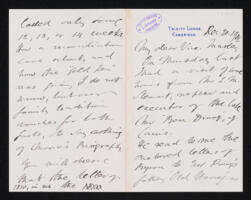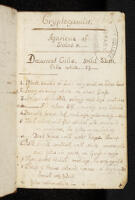Draft for book, identified by Isaac Todhunter as drafts of pp. 12-17, 33-36, 38, 42-44, 177-180, and 320-397.
Printed pages to p. 224.
Cambridge University 'is a vile university and the vice chancellor is a damned vice chancellor. - But if possible I will waste no more time in exclamations and give you the facts - scene - Union debating Room - Time - six o'clock. - Knock at door - silence - enter the red round idiot head & turkey cock breast of Okes [William Okes] - Hon. gentlemen stare - enter the inflexibly meek countenance & proctorial smile of French [William French] - stare wider - Okes running himself against the table & addressing the president. "Vice Chancellor sent us to say he don't like these societies - all to go home". French "The Vice Chancellor desires you to disperse & to meet no more". - Pres. requests the messengers to withdraw that soc. may consider of it - "No - not a subject for your consideration - you must oblige" - so the vice chancellor dislikes these societies - but suppose we reject political subjects - will he let us discuss literary ones - "Can't say - no authority - but V.C. is in the house we will mention"[.] [Says] again "no societies at all to be allowed - all to disperse". But we must finish this meeting - we have financial matters - V.C. is here - you will let us send a deputation to him - Whewell - Thirlwall [Connop Thirlwall] - Sheridan [Charles B. Sheridan] - ushered into a room - V.C. in full silks - head white[,] face red & ugly. - Jackson in the background - Red nose of [Hornbuckle?] sticking across the room - and o sorrow & shame! Monk [James H. Monk] - (Why the devil - fool as he was - did he not let it be a Johnian business as it deserved to be) - "We are told you have an objection to our debates - want to know how far it goes - literary subjects?" "No sir - they are against the statutes - all meetings at regular times for the purpose of debate are - hum - haw - hum irregular - and you have only three years - you have other things to do - you take too much upon you - your knowledge[,] your reading[,] your minds are not proper food..." "I am afraid we are not to be allowed to consider the reasons - we must submit to the authority" A move at the word authority "But the case must have been exaggerated - two or three hours a week" "Sir I have had a letter from a person who once belonged to the society and who says that his prospects have been ruined & that the prospects of several of his friends have been ruined by the time and attention he has bestowed on the Society." "Very unfortunate - but it is impossible this can be common." "Sir it is against the statutes - you must disperse." But we may retain our reading room - and continue our present debate - granted. - Long debate - all manner of motions - Remonstrances proposed. - Committee - Whewell - Thirlwall - Sheridan - Lawson - Lodge - My Lord Chief Justice a fool as usual and apparently somewhat frightened. - Committee met today. Now what think you of this? - It is not yet decided what is to be done but of course there must somehow or other, a great noise be made. Do you not think it would do good to write to Clarke & inflame him about it. - And to write to some of the newspapers - it has been proposed to petition the chancellor - write immediately and tell me what you think. - I have done nothing for Lacroix [Silvestre F. Lacroix] yet but we will talk of that another time'.
Trinity Lodge, Cambridge.—Encloses six letters (2–7) written by Lord Byron to Henry Drury, which have been bequeathed to the college by the son of the recipient.
—————
Transcript
Trinity Lodge, Cambridge
Dec. 20. 1902
My dear Vice-Master,
On Thursday last {1} I had a visit of some hours from Mr L. M. Stewart, nephew and executor of the late Mr “Ben Drury,” of Caius {2}.
He read to me the enclosed letters of Byron to Mr Drury’s father, “Old Harry” as he was called at Harrow, a Son of Dr Joseph Drury the Head Master.
He left out one sentence in one letter about the Turks, which he told me was disgusting {3}, and I have not seen it.
The letters date between 1807 {4}, when the Hours of Idleness were published, and 1815 soon after Byron’s Marriage.
As there are numerous references to my Father, it may be well just to point out that my Father succeeded Dr Drury at Easter, 1805, and that Byron left the School that summer, i.e. I suppose, at the end of July. Consequently, their relation as Master and Pupil lasted only some 12, 13, or 14 weeks. How a reconciliation came about, and how the “gold pen” was given, I do not know, but our family tradition vouches for both facts, to say nothing of Moore’s Biography.
You will observe that the letter of 1810, in wh. the {5} reference to the “gold pen” occurs, describes the famous swim from Sestos to Abydos, and adds—what I had either not known or forgotten—that the swimmer had made a previous attempt which failed.
May I ask you and Dr Sinker kindly to take Charge of the letters, which Mr Benjamin Drury bequeathed to our Library, and to consider where and in what form they may best be kept. The fact that they are a bequest should be specially recorded.
Perhaps it might also be recorded that Dr Joseph Drury, the Grandfather of the Testator, was himself a Trinity man. His Son, “Old Harry,” to whom Byron wrote the letters, was at Eton and King’s.
I am, my dear Vice-Master,
Most truly yours
H. Montagu Butler
—————
2 folded sheets.
{1} The 18th.
{2} Benjamin Drury’s sister Emily (1813–1902) married Stewart’s father, Lestock Wilson Stewart (1824–1876), an army doctor, in India in 1852.
{3} See the letter of 3 May 1810 (R.2.40A/4). Stewart may well have omitted more than one sentence.
{4} The earliest of the letters (R.2.40A/2) in fact dates from 13 January 1808, but it was misdated 1807.
{5} ‘1810’ struck through.
Includes drafts and notes.
Notes relating to the pendulum experiment in the Dolcoath mine, with calculations on the elevation of houses, with many other miscellaneous notes.
Daily list of books read, kept from 16 Oct. 1817 - 16 Dec. 1817. With a note in the first entry explaining that he has "found it extremely convenient to keep a waste book of my reading &c. Artificers who work in gold have a vessel to receive all the filings that fall from their work - but I am not a gold worker - This is rather a bag to receive all old rags, scraps & remnants."
Inscribed to Whewell by the author.
Undated lectures, accompanied by a list made by Isaac Todhunter describing almost all of them.
Encloses a copy of a "miscellaneous article" on etymology.
Two undated notebooks and a notebook kept by "[J.?] Hewitt, Queen's College, 1781".
Lectures 1-8 in four notebooks. The first volume has a note from Isaac Todhunter laid in loose at the front.
Lectures dated 15 Jan. 1847 - [1847].
On the front is stamped ‘ORIGINAL DOCUMENTS & PAPERS.’ The documents are accompanied by folded sheets of blue paper bearing descriptions of the documents, in which they were evidently kept before they were bound.
Zonder titelOn the spine is stamped ‘DECLAMATIONES | — | TRIN. COLL. CANTAB. | TOM. | I. | 1799–1809’, and inside the front cover is written, ‘Declamationes in Coll. S.S. Trinitatis Cantabrigiae | habitae | Tomus. I. | 1799–1809’. The dates in these titles do not match those of the contents. The manuscripts in the volume appear to be autograph.
Zonder titelIncludes letters by J. O. Halliwell, J. M. Heath about the August 1846 storm in Cambridge, H. Montagu Butler about a bust of Archdeacon Hare, Vernon Musgrave about a memorial to Archbishop Musgrave, with a draft from William Whewell to Vernon Musgrave.
Zonder titelOn the fly-leaf are some lines of poetry partly pencilled and then inked over, partly in ink originally. On the fly-leaves at the other end are further fragments in ink and pencil, and one is headed: ‘Plan of a Poem. The Seasons. | Spring. The Visitation, &c.’ Other verses in pencil are on blank pages in the body of the volume, which consists of botanical notes, predominantly on fungi. At the other end is the date 23 Sept. 1793.
Zonder titelMostly printed. Also including several pieces by Richard Shilleto.
Collected by William Hepworth Thompson?

